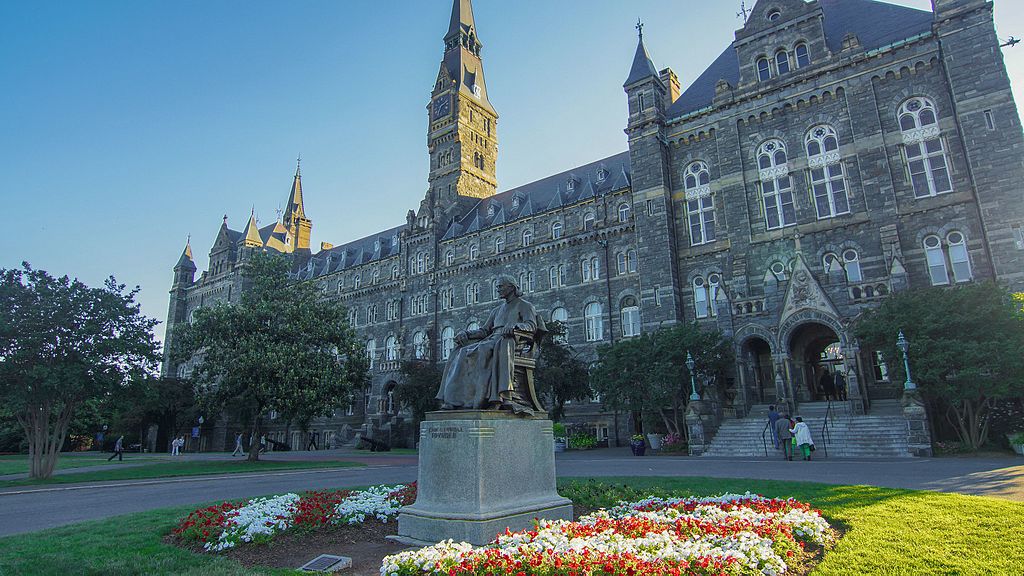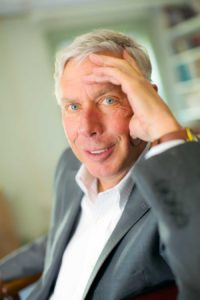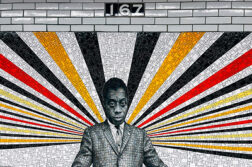
I WAS A FRESHMEN at Georgetown, America’s oldest Catholic university, when I realized I was gay, so it seems fitting that my coming out story should sound a lot like Saul of Tarsus on the road to becoming St. Paul—lightning bolt of recognition, life-altering epiphany.
In February 1968 I was walking back to the university from Washington’s Foggy Bottom, where a high school friend and her mother were staying for the weekend. The three of us had gone out for a long leisurely dinner, and it had grown late and cold. As I walked the cobblestone streets towards campus, it seemed God-sent when a car pulled beside me and the driver leaned over, rolled down the window, and asked if I wanted a ride. The wind was lacerating, the night speckled with snow, and I was all too aware that my flimsy denim jacket wasn’t cutting it. I hopped in.
One would think that the man’s face would be permanently imprinted in my mind, given his brief but pivotal role in my life. Truth is, I can’t remember anything about him except that he had a pleasant enough smile and was considerably older than me. Then again, I was eighteen, so most people seemed considerably older. He might have been all of 25. Or the ripe old age of thirty.
It was cold, we both agreed. Terribly cold. And snow was so rare in Washington. That was the extent of our conversation as we slowly drove Georgetown’s elegant dark streets. Then just as we crossed Wisconsin Avenue, he turned to me and asked, or at least I thought he asked, “The main gate?” and I chirped back yes, the main gate would be fine.
A silence, a pause, then slower this time, clearer: “Are you gay?”
Well, it wasn’t as if I had never thought about it. Every boy of that era relegated to right field had considered the possibility, hadn’t they? And there had been touching and tickling with a neighborhood boy at seven or eight. All kinds of furtive feelings that were banished and suppressed throughout high school. But gay? Me?
“No,” I replied. “I’m sorry.” The apology was entirely sincere. I was the kind of eager young man who didn’t like to disappoint others, and for this very kind man on this very cold night I was obviously a disappointment. “I really am sorry,” I repeated. “So sorry.”
As requested, he dropped me off at the main gate. I apologized a few more times, thanked him yet again, then watched the car drift off into the night.
Head throbbing, heart pounding, I took a few steps towards my dorm, when a voice like a whirlwind rose from somewhere deep inside. “Yes, you are,” it insisted. “Yes, you are.” Suddenly everything made sense. I didn’t want to be like Jim Morrison; I just wanted him.
Back onto the cobblestone streets I went, desperate to find that car, to tell the guy yes, I was wrong, I am gay.
I walked for hours but the car, of course, was long gone. Shortly before dawn, I made my way to my dorm, shivering with cold and the new knowledge of who I was, eager to learn what that meant.
One thing I learned quickly was that there were streets in posh Georgetown where cars circled blocks and solitary men walked slowly, peering into car windows. I became one of those walkers, and eventually one of those cars stopped and offered me a ride. This time, asked where I was going, I replied, “Oh, anywhere,” and I knew the deal was sealed. The faceless man in the very tight jeans drove us to another part of town and I had my first gay sex in the front seat of a Ford Fairlane. President John F. Kennedy once quipped that Washington was a city of Southern efficiency and Northern charm, which was my experience exactly.
Some months later a guy took pity on me and took me to my first gay bar. I was a mass of nerves, so he picked an out of the way place on Capitol Hill, a dive really, and in late afternoon, when we walked in, it was fairly empty. That didn’t stop my hands from shaking so violently that my drink sloshed over the sides.
Then I looked around. There were a dozen or so men, mostly seated at the bar. But there were also a number of straight interracial couples. Washington was a provincial city—the furtive gay cruising just one example of its small-mindedness.
Truth is, what I learned from that first time in a gay bar was a lesson that would serve me well when Stonewall happened the following year: that all struggles for freedom and justice are intrinsically linked. That was the gospel I took with me that afternoon and it still serves me well, all these many years later.
 Paul Genega is a poet, playwright, and Professor Emeritus of Creative Writing at Bloomfield College, New Jersey. His seventh volume of poetry, a New & Selected collection, is forthcoming from Salmon Poetry in 2022. He is also editor of Three Mile Harbor Press, which seeks new voices in LGBTQ, feminist and environmentally aware poetry.
Paul Genega is a poet, playwright, and Professor Emeritus of Creative Writing at Bloomfield College, New Jersey. His seventh volume of poetry, a New & Selected collection, is forthcoming from Salmon Poetry in 2022. He is also editor of Three Mile Harbor Press, which seeks new voices in LGBTQ, feminist and environmentally aware poetry.





